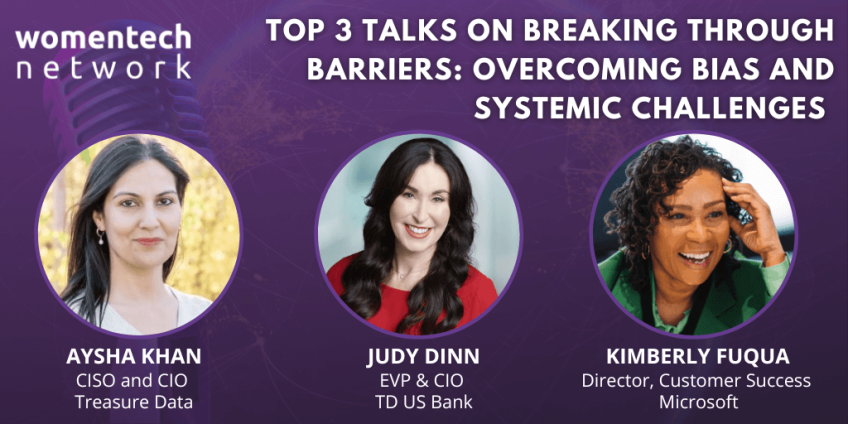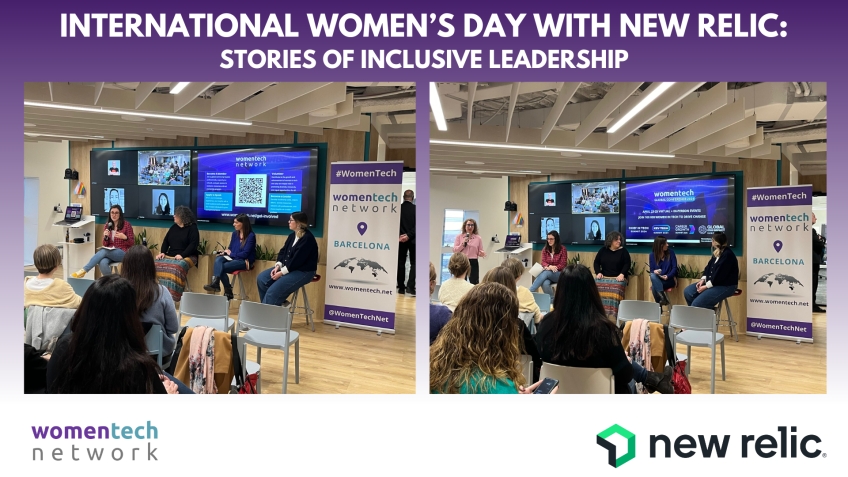Unlock the Secrets to a Successful Career in Tech by Ronke Babajide
Unlock the Secrets to a Successful Career in Tech
Good morning, everyone. Welcome to my session where we will explore the intriguing world of careers in tech. As a woman active in this dynamic field for over two decades, I am thrilled to share with you my experiences and insights.
About Me
My name is Ranka Bacha, the face behind the renowned women in technology advocate based in Vienna. However, I didn't begin my journey in the world of tech. Growing up during the analog era, my ambition led me to study chemistry at the University of Vienna, eventually earning a Ph.D. in the discipline. Alongside this, I also obtained a life coach degree owing to my deep interest in people and career development.
Analyzing my journey, it's noteworthy to mention my considerable time spent as the only woman in the room. Fast forward to recent years, more women are stepping into the tech field, bringing a vibrant mix into the working environment and making it all the more enjoyable.
Over time, my passion for diversity, equity, and inclusion drove me to create Women in Technology Spotlight, a podcast that sheds light on women in tech, their struggles, and their advice to budding tech enthusiasts. In addition to creating content, mentoring aspiring female tech enthusiasts and writing about technology and science-related topics also hold a special place in my endeavors.
Advantages of a Tech Career
Speaking from experience, working in the tech industry is both rewarding and enlightening. From shaping the future to traveling to new places and interacting with intriguing customers, technology jobs offer numerous exciting opportunities. Even in a male-dominated field, women can still carve impressive and stable careers. Particularly, three incentives stand out: financial freedom, flexibility, and choice. Notably, technology is among the industries with the smallest gender pay gap, earning you high wages and guaranteeing a comfortable life.
Debunking Tech Myths
Common misconceptions paint a worrisome picture about tech. Let's dispel three popular myths:
- You don't have to be a man – despite conventional thinking, working in tech doesn't necessitate being male. Significant women have marked history in tech, serving as inspiration for many others.
- You don't have to study computer science – it's possible to switch careers and enter technology even if you haven't pursued a computer science degree.
- You don't need to know how to program – tech is much more than software development. There are many none programming roles available.
However, to thrive in tech, you need to possess a growth mindset, have a passion for what you do, and demonstrate curiosity.
Career Success Strategies for Women in Tech
Despite the increasing number of women joining the field, men tend to be more successful. This is because the workplace has been molded to suit male characteristics over time. For women to enjoy career success in tech, four strategies are essential:
1. Networking
- Build your internal network when starting a new job.
- Establish networks of friends and allies.
- Practice leveraging your network and ask for help when necessary.
- Seek out mentors and sponsors who can open doors for you.
2. Visibility
- Practice self-promotion organically without becoming annoying.
- Volunteer to handle high-profile tasks.
- Share your ideas in meetings and discussions.
3. Goal Communication
- Clearly communicate your career goals to your superiors.
- Ask for detailed feedback on your progress.
4. Boundaries Formation
- Learn to say no to tasks that don't advance your career.
- Don't sacrifice your main tasks for other people's comfort.
Finally, based on my extensive chats with successful women in tech, I advise you to explore, try things out, accept failures, and switch if you're not enjoying your job. Moreover, always strive for self-realization instead of seeking others' approval, seize new opportunities fearlessly, fulfill your own expectations, and refuse to let anyone else define you or your capabilities.
Connect
Reach out to me on LinkedIn if you wish to further engage in enlightening conversations about tech. I'd be delighted to connect with you all and answer any inquiries you have. Besides, check out my YouTube channel and my audio podcast for more interesting content.
Thank you for attending my session! I hope the insights were helpful, and you're leaving with valuable takeaways for your tech journey. Enjoy the rest of the conference, everyone!
Video Transcription
Good morning. Once more, everyone. Uh Welcome to my session. Unlock the Secrets to a successful career in tech. I'm so happy to have you here. Um First a couple of things about myself. My name is Ranka Bacha.I'm based out of Vienna and I've been a woman in tech for more than 20 years. But initially, I did not set out to become a woman in tech. Um When I was young, we didn't have computers everywhere. The world wasn't digitalized. Actually, I'm so old that my baby photos are in black and white. So I set out to study uh chemistry at the University of Vienna and acquired a phd in chemistry which tells you that I'm one of those career switches and I switched into tech. I also have a degree as a life coach because I've always had an interest in working with people, talking to people and furthering their careers. So in those 20 years in it, I was often the only woman in the room and in the previous years, in, in the recent years, this has changed a little bit. We, I have seen more women come into the field and what I realized is that it makes working in it so much more fun having more women around. So I decided to um involve myself more in the whole de I uh movement.
I've become a diversity equity and inclusion advocate. I have created a podcast called the host. Uh I, I'm hosting the women in technology spotlight, which is available on youtube and in on every audio podcast client. Um What I do is I talk to women about how they became women in tech, um what their obstacles were and what they actually recommend, recommend to other women going to field. And I've learned a lot from talking to those women. I also mentor a lot of women who are coming into the space. I write articles about career in tech, about technology and about other topics that I find interesting about science and also about um other things you can find my blog on medium and I speak at events like this. So enough about me. Um Let me tell you why I think working in tech is great and why I think um you should consider a career. I assume that a couple of you are ready to uh working in tech and since you're joining this conference, but let me tell you what I have learned.
So over the years, even though this is a very male dominated field, I've learned that working in the tech industry is just great for me. It has been an amazing journey. Um I get to go out every day and shape the future. I work with interesting customers. I travel, I get to talk to people. I go places I would never go if I wasn't working in tech. Because what has happened is that the whole world is dependent on digital um products. It can be whether it's uh the um connectivity, whether it's storage, whether it's um it's, it's servers, nobody can have a business nowadays without technology, which means that the job opportunities are actually great. And my, in my experience and contrary to common belief, um working in the tech industry, even though it's so male dominated is an excellent, is excellent for women. It's a great place to have a good career and a good and stable career. So one of the top three incentives I see and one and that I want to actually stress that one is financial freedom. Working in tech has given me the opportunity to have a life where I can decide where I want to live, how I want to live. And it has given me the resources to do. So. Um the tech industry is an industry with one of the smallest gender gaps for now. It didn't, it wasn't always like this.
But since there are a lot of movements around D I, there are a lot of programs especially in the big companies. Um The gender pay gap is on average, only 96% compared to 70% in all other fields. And on top of that, the wages in tech are much higher. So that's one of the incentives I see uh why women should go into the field instead of, you know, choosing one of those traditional female jobs. Another thing I find very important is the flexibility it gives you working from home. Remote working has been part of my life for the past 15 years, I've always um had the opportunity to also work from home in an hybrid in a hybrid way which allows me to integrate my work and my, my life in a way that would not have been possible if I had to work in an office.
And the third thing and I think we shouldn't underestimate that is choice. Um When we say we work in tech, that can mean a lot of things tech is not equal to tech. Um Technology is used everywhere nowadays. So it's easy to find a niche that actually encompasses something that you're interested in. Meaning. Um let's say, maybe even something like knitting, maybe say you're interested in knitting, you will find a company that works around with yarn and, and with knitting machines and they will need someone who um who understands the technology, technology, you need to run that. So no matter what your actual interest is in life, there will be a job um that uses tech and that gives you um these things I've talked about financial freedom and flexibility and that and still um include something that you find fun. So there's a lot of bias around, you know, or, or prejudices about what it means to work in tech. I already mentioned one and that is that it's very male dominated. Let me tell you the three things you don't need to work in tech and to have a good career, you definitely don't have to be a man. Even though um people when you tell them you work in tech still tend to say, oh, you work in tech?
That's so unusual. Um Are there, are there are too many men? How do you feel working in tech? Let me tell you, working with men is easier than you might think in my experience. And I must say, as I said, I've been in tech for over 20 years and, and it was even more uncommon than I could uh recount maybe one or two bad experiences. So you don't have to be a man. Men are not better at tech and math. And you have to realize that this trope that of the male nerd. It didn't come around until the eighties when the personal com computer became more common before that. And um even in the fifties and sixties where it was very common for women to be software developers, then go and Google uh women in tech, I actually wrote a couple of articles about that. Think about people like Grace Hopper, uh think about uh women like like Margaret Hamil Hamilton and all these great women who came before us. And even more recently, Radia Pollman, who is the mother of networking basically. So there were so many women in tech before the eighties turned the whole picture of what it means to work in tech on its head. Another thing you don't have to do is study computer science.
So from those women I interviewed and also from my own experience, as I said, I actually have a phd in chemistry. Um A lot of successful women actually switched into a career in tech later in life. One of the reason that is so common is that women usually tend to not be encouraged to work with computers or play with computers or work with technology when they're younger. So they don't realize that they're actually interested. And because they don't realize this at a young age, they don't go and study computer science. And then when they realize uh that this is a field they actually want to work with, with, they switch careers and they have like this uncommon route into tech. So you don't have to be a computer scientist. It's actually possible to learn anything or any skill you want if you are passionate about something or interested in something, all that I know about technology. And I have been working at some of the biggest tech companies. My recent job was at VM, I was a lead solution engineer for um cybersecurity. Everything I know about these topics I've learned myself. So it is possible and you can be successful. So you don't have to know how to program. I think that's one of the other tropes around technology. When you think about tech, you think about this young guy in a hoodie sitting in front of the computer and hacking into his keyboard. That's not tech.
Tech, as I said, is everyone nowadays, not everyone is a software developer. There are so many jobs that are um that encompass technology but do not um you know, mean that you have to to learn how to code but things you will need to have a good career in tech is definitely a growth mindset. As I mentioned, you have to be willing to learn new things. The tech industry is constantly changing. So what was there are basics? Of course, I mean, uh certain protocols have been around for a while. If you look at the internet, you will realize it's built on technology that was um invented in the sixties and it's still it's the kind of works. So um you have to be willing. So some basics will always be there. But things change and things change quickly. If you have this fixed mindset that there is a certain amount of things you know, and you can do. Um you will not thrive in the tech industry, you have to be willing to learn. And you have to believe that you can understand new technology and you can, I'm deeply, uh I deeply believe that everyone can learn something new if you want, if they want to. So what you also need.
And that is probably true for every career, not just in tech is a passion for what you do. Of course, you can have a job, you can go there from 9 to 5 and do the work you're given and you know, have a mediocre career. But if you want to have a really good career and have fun in life and have fun in your job, you need a passion for what you do. So this does not mean that you should drop your day job and just go out and find some fun thing to do. But whatever you choose and whatever role you choose in tech, you should be passionate about the outcome of that role. So for me as a solution engineer, I was always passionate about building a good solution for my customers. And that would mean that I loved seeing what they would do with uh what we as a company sold them. You have to have an interest in what you do. And the third thing that you actually need is curiosity. As I said, things change a lot, things change often and you have to learn new things and it's easier to learn new things if you're actually curious about what uh these things do. So um having this curiosity and this growth mindset and the passion for what you do are prerequisites for having a career in tech.
And it doesn't matter whether you're a woman or a man, these are just things that make working in tech in this field, that's so um quick paced and changing easier. Um Now, even though there are more women coming into the field, uh men tend to be more successful in a career in tech. And there are a couple of reasons for that. One of the reasons is of course, that men have built the workplace in a way that suits their characteristics and uh women are different. So to have a career uh in tech or successful career, you have to understand how the workplace is shaped, that does not mean that you have to become one of the boys. Um But you have to understand what is holding you back. And there are four things that men do that we don't necessarily do from the um naturally and one of them is immediately building relationships. Women tend to overvalue competence over relationships in the workplace, which means not that they don't like to have uh uh um allies and friends in the workplace. But they feel as if they have to uh first learn everything about the job before they are allowed to contribute.
That's not true. And the second thing is women have an issue with visibility. Uh Women are socialized to be less inclined to self promote and talk about what they're good at, talk about what they're doing. And this is also holding them back because the ma the male workplace expects you to self promote. Another thing that women don't do, they don't have the clarity about where they want to go. And even if they have that internally, they fail to communicate it. And I'm not saying that you don't know what you want to do with your life. I'm saying that you will probably not be inclined to go to your manager and say you want to have that boss because at least that's my experience. And a lot I did it, a lot of women did it. We failed to say um to our managers that we are interested in a certain position and they didn't understand because men would um actually go and tell them while I for example, would expect them to know that I was ready to take on um new responsibilities. So this is something and we do differently and then men are usually better at setting boundaries and um are less likely to suffer from the disease to police. So to have a successful careers, there's um four strategies that I would like to um recommend to you.
One is networking. The first thing you should do when you start a new job is make sure to build your own internal network, go out get to meet people, make sure people know you and know what your role is and what you are going to do in this company. The second thing is find friends and allies. It's easier to thrive if you have your tribe and this tribe does not have to be solely woman. Of course, it's great to have women in who do something similar. But sorry, you can also find men who you uh work well with who you enjoy working with and just build uh friends and allies. Then one thing you have to learn is to ask for favors and for help, you have to practice uh leveraging that network you have built. And because women tend to feel bad when they ask for a favor and men don't, men just feel that they can ask for favors because they will be able to give something in return.
And so can you, but um usually women have to practice asking for help and favor more. So another thing um mentors are great. Find a mentor, find a mentor inside or outside your organization. Find someone that can share their experience about what it's like to work in tech, help you with decisions, tell you how to behave in certain situations, that's all great. But the most important thing is find a sponsor, a mentor is not someone who will help you get a promotion. A mentor is someone more like a life coach. A sponsor is someone who has the power to open doors for you. That can be someone who's higher up in the position, who has a very good network, who knows a lot about new opportunities and who is willing to mention your name when an opportunity arises and to actually recommend you for that position. So, in my opinion, because in my life, I never had a mentor um in because that was not usual when I was younger, mentoring was not a thing. Um But I had a lot of sponsors and that helped me have a great career so have uh look out for sponsors. The second career strategy is make sure you're visible.
I mentioned this uh when I said, you have to, to look, make sure that people know what you do but get comfortable with self promotion. That does not mean that you have to be that annoying guy who constantly talks about himself. I mean, in your case, a girl, but you know, those guys who constantly talk about their achievements and what they did and blah, blah, blah, you don't have to become like that. You have to find a way to make sure that whatever you're doing is visible. Which means for example, you can um build a habit of of writing a weekly email that you share with your and manager, what you did during that week, you can take on highly visible tasks, which means like, for example, if there's an event volunteer to speak, don't go and organize the company picnic.
People will love you for that, but they won't promote you and also make sure to attend important events and network and talk to people. As I said, volunteer to present um, at such events because people will remember you from these things. They will, um, if you organize company picnics, they will love you. And they will always, uh, say that you're a nice person, but they will not uh think of you as a competent person. And the other thing is remember to speak up, share your thoughts in the meetings. Don't worry too much about whether it's a good idea. It's a bad idea. Men don't worry about that that much. They just talk and you can too. So that's the second thing. Visibility. The third thing is, and I mentioned a little bit about that. Communicate your goals, tell your manager where you want to go, tell him what you think your career should look like. Tell them what you're interested in, ask them what is necessary to take that next step. It's not just enough to, to um say, OK, I want to be, I don't know, a lead uh solution engineer. You have to understand what it takes, ask them to communicate what is necessary. Um then document what they told you, share your documentation with them and then, you know, also document your progress and keep a diary or if there is an internal tool document what you have done to reach that next step and ask for detailed feedback.
Men tend to give very wishy washy feedback to women and usually, uh that's not helpful if you feel that you don't know what is missing and why you're not getting a promotion. Ask your manager for detailed feedback and insist that they tell you what you need to do to take the next step. And the fourth thing that I want to stress is create boundaries, learn to say no to things that do not further your career. This does not mean that you're not supposed to help your colleagues. But as I said, um don't go out and say, OK, I'll organize the team event for the third time because people tend to burden especially women and underrepresented groups with things they don't want to do because we usually have uh this, this trouble saying no, because we want to be liked.
Remember your work comes first, whatever you need to do to be successful, you have to do first and that's your work and whatever time is left, you can volunteer for other things. Remember, likability is not the goal. It's great if people like you but accept that not everyone will, don't try to please these people, you know, do your job, be competent, learn to say no, when stuff is not yours, focus your energy on yourself and your career. This is something that women um tend to not do enough. So these are the four strategies that I would recommend. And I have to hurry up a bit because I only have 20 seconds left. And I want to share a couple of things I learned or women told me in my interviews in the women in technology spotlight. And there's a lot of themes that come up again and again, explore things and try things out, allow yourself to fail switch. If you don't like what you're doing, don't think that you have to stay in a career. Don't ask for permission. You allowed to, to do whatever you like as an adult. I mean, of course, in the, in the boundaries of the law, but don't ask for permission, there's nobody there to give you permission to live the life you want to have, don't say no to an opportunity. Even if you don't feel you're ready.
If someone asks you to do something, they probably have decided that you already say yes to opportunity. Don't try to fulfill other people's expectations of yourself because um they don't actually know you fulfill your own expectations, network, cultivate the growth mindset and don't let people tell you who you are. Don't let them put you in a box and tell you what you're capable of.
Show them what you're capable of. And with that, I would like to end my session if you would like to reach out and connect uh to me on linkedin. These are my QR codes, you can scan them in. I also have, you know, the podcast on youtube and as an audio podcast and I've built this session, uh this platform where women can connect and it's just, you know, um been finalized and there's not a lot happening yet, but I have big hopes for the future. Thank you all for joining my session and thank you for being here. Thank you everyone. Thank you. Um If you have any questions you can reach out uh on linkedin. Um It was great to have you all here. Thank you. Enjoy the rest of the conference everyone. Bye.





